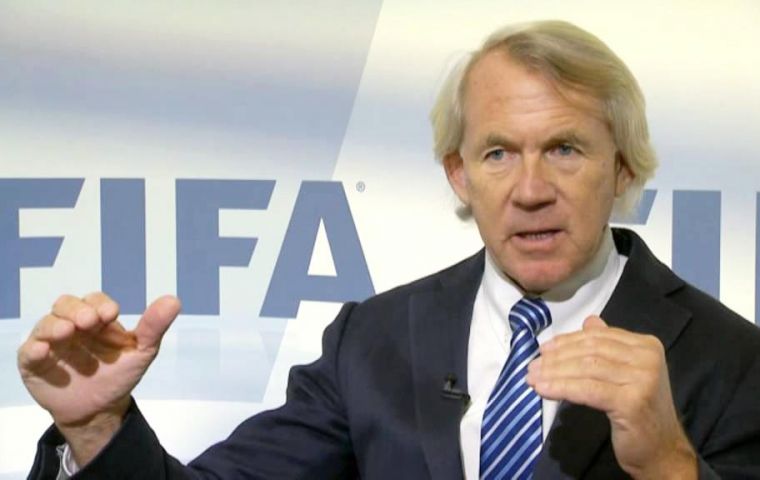MercoPress. South Atlantic News Agency
FIFA will conduct surprise doping tests of all World Cup players
 FIFA chief medical officer Jiri Dvorak will appeal to the players' 'biological passport'
FIFA chief medical officer Jiri Dvorak will appeal to the players' 'biological passport' FIFA is expected to conduct surprise doping tests of all World Cup players at least once beginning in March, setting up biological passports to determine possible irregularities in blood and urine samples. FIFA chief medical officer Jiri Dvorak said all teams and players should be tested unannounced between March 1 and the World Cup opener in June.
In a news conference, he also said FIFA’s medical staff will decide before games whether drinking breaks will be used during the World Cup in Brazil. He said soccer’s governing body is not overly concerned with the heat during matches in the jungle city of Manaus, which will host matches by England, Italy, Portugal and the United States.
Dvorak said surprise visits will be made to get samples from an “entire squad” after March 1, which is when teams have to tell FIFA where they will be training and playing friendlies ahead of the World Cup.
“We will test all teams and all players between the first of March and the kick off, unannounced, at least once,” Dvorak said.
Many World Cup teams will be playing warm-ups on March 5, which already falls within the window FIFA can begin its tests.
“From now on every player competing in the FIFA World Cup Brazil could be tested at least once, at any time, in any part of the world,” he said.
FIFA has used the biological passports during recent Club World Cups and the Confederations Cup last year in Brazil. It will be the first World Cup where FIFA uses the system, which helps detect illegal substances from changes in a player’s blood profile. FIFA will also be using a urine profiling technique to detect steroids. Dvorak reiterated that the samples from the World Cup will have to be flown to a laboratory in Switzerland because the Brazilian lab expected to be used during the tournament lost its accreditation from WADA.
Despite some team complaints about the weather conditions expected in the northern jungle city of Manaus, Dvorak downplayed the problem, noting that during the Beijing Olympics temperatures were significantly higher and the health condition of participants was not jeopardized.
“We don’t think the conditions in Brazil will be as difficult as people are saying,” he said. “We can introduce extra water breaks and provide players with cold towels where necessary, but that’s a medical decision that will be judged on a case by case basis, before each game, by our team of health professionals.”




Top Comments
Disclaimer & comment rules-

-

Read all commentsIf Maradonna was still around they would need to dope test the manager.
Feb 18th, 2014 - 07:23 am 0FIFA should also adopt instant TV playbacks , as the TMO used in international rugby. Those against it claim it would take the spontaneity out of the game....so, they prefer to allow the possibility of a team winning unjustly, changing the course of a whole championship, rather than catch crass errors by the refs ??....not very sportsmanlike...another thing, a lot of players are sissies, just touch their leg and they roll over 10 times holding their faces...should be kicked off... just a bunch of bloody POOFTAS...
Feb 20th, 2014 - 08:21 pm 0Commenting for this story is now closed.
If you have a Facebook account, become a fan and comment on our Facebook Page!